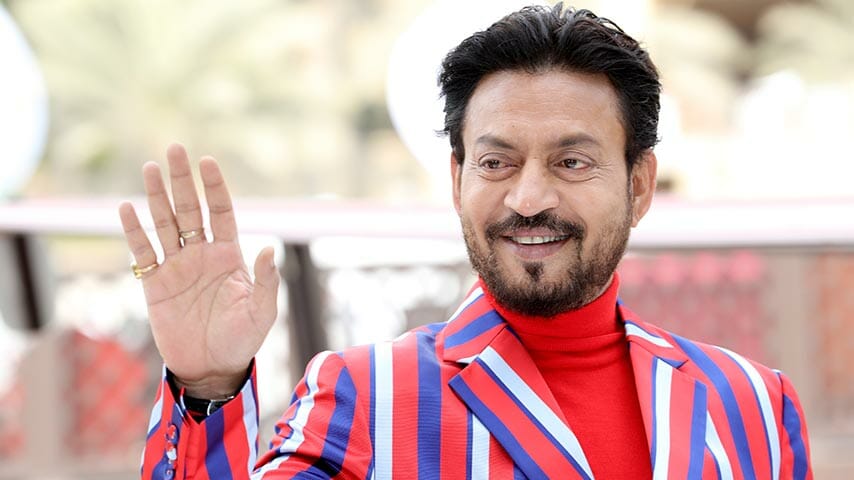Irrfan Khan, 1967-2020
Images via Vittorio Zunino Celotto and Neilson Barnard/Getty Images
To be able to say so much without saying a word—a look into the middle distance, a sigh, a slight lean forward while hunching one’s shoulders, or just a casual wave of the hand—it was an art in which Irrfan Khan excelled. When he did speak, the unusual timbre of his voice, which you could describe as either honeyed or raspy, his craggy face breaking into a slow and easy smile: He could take your breath away.
He did all this and more while playing everyday characters in Bollywood and Indian art house cinema, whether it was soft-spoken Bengali academic Ashoke Ganguli in Mira Nair’s The Namesake (2006), lonely widower Saajan Fernandes in Ritesh Batra’s The Lunchbox (2013), straight-shooting taxi-company owner Rana Chaudhary in Piku (2015) or upstart boutique owner Raj Batra in Hindi Medium (2017). There were also smaller parts in British and Hollywood movies: a police officer in Slumdog Millionaire (2008), a ruthless corporate executive in The Amazing Spider-Man and the adult, titular character in Life of Pi (both released in 2012), as well as an immigrant father-in-law in the third season of the HBO series In Treatment (2010)— all roles Khan simply dissolved into.
Irrfan Khan died on April 29, 2020 in Mumbai. The news wasn’t particularly shocking to those who knew of Khan’s ill health. In March 2018, he disclosed his diagnosis with a rare neuroendocrine tumor. While seeking treatment in London, he occasionally mused about his treatment in tweets and letters that revealed a philosophical side laced with acerbic humor.
Clearly, Khan in his many avatars touched the lives of many people in a deep and meaningful way. How else can I explain my Facebook feed that quickly filled with tributes to him, when news of his death started spreading on social media? Many of the eulogies had been written by people who don’t necessarily see themselves as film fans. It’s a testament to his capabilities as an actor that many people are feeling his passing as a personal loss.
![]()
My earliest memory of seeing Khan act was in a dreadful Indian TV series called Chandrakanta (1994). He played the role of a spy in the fantasy show about two lovers from rival kingdoms who are kept apart by scheming courtiers and magical spells. Khan’s twin characters Badrinath and Somnath were outlandish, his brows disappearing into his heavily kohled eyes, a bad wig and garish red costume completing the bizarre look.
As a child, I had also seen him previously in the roles he played in a dramatized historical series called Bharat Ek Khoj (1988), which was based on the book Discovery of India by India’s first prime minister, Jawahar Lal Nehru. I wasn’t until I was much older that I realized the parts he played.
I’m sure I caught him in Hindi films here and there, but it wasn’t until Vishal Bharadwaj’s Maqbool (2003) came to Toronto as part of the Toronto International Film Festival that I really got to both dwell on Khan as an actor, and to interview him. As an English literature student at the time, I was taken by Bharadwaj’s adaptation of Macbeth into Mumbai’s mafia world. It featured a stellar cast of Hindi cinema heavyweights, but it was Khan as Maqbool and Tabu as Nimmi who stole the show. Their chemistry was mesmerizing, and Khan was a revelation. (It’s a little hard to recall our conversation, but I do remember coming away from the interview marvelling at Khan’s nonchalant attitude.)
Then came The Namesake, in which Khan was paired up yet again with Tabu, but this time playing Bengali immigrants in Brooklyn. I will admit to preferring the film over the book—a rarity for me—because of Nair’s evocative translation of Pulitzer Prize winning author Jhumpa Lahiri’s word to visuals, and the quiet dignity that Khan lends to an academic who struggles with the joys and challenges of building a new life as an immigrant, husband and father. I still remember the endearing exchange between Ashoke (Khan) and Ashima (Tabu), mostly made up of gestures, when Ashima makes a mistake while washing their clothes at a laundromat.
Then it seemed the whole world discovered Khan in The Lunchbox. He had, of course, already appeared in movies such as Slumdog Millionaire and A Mighty Heart, not to mention many Hindi films in supporting roles. (In fact, his real international debut happened in 2001 with British filmmaker Asif Kapadia’s The Warrior, which revived Khan’s interest in films after a long period of playing smaller roles. He played the leading role of a warrior in feudal Rajasthan, the Indian state Khan was born in, who renounces violence only to be chased by it.)
-

-

-

-

-

-

-

-

-

-

-

-

-

-

-

-

-

-

-

-

-

-

-

-

-

-

-

-

-

-

-

-

-

-

-

-

-

-

-

-








































